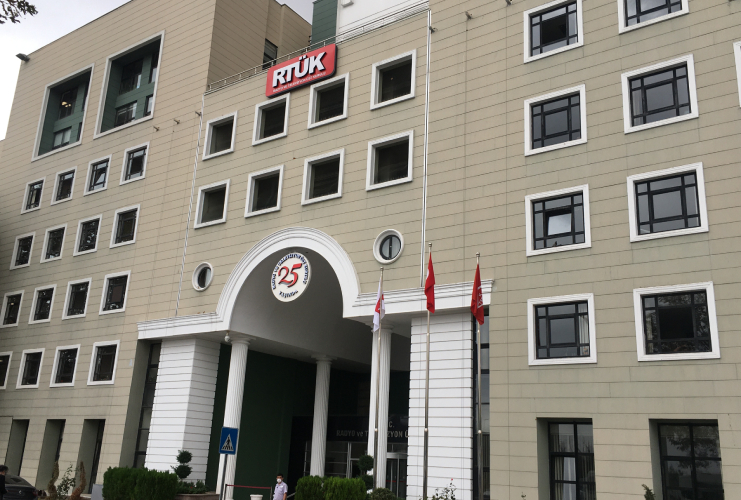New data on fines handed down by Turkey’s Radio and Television High Council (RTÜK) confirms that the regulator continues to disproportionately target critical and independent television broadcasters. The fines are a growing problem for media freedom in Turkey and clear example of regulatory capture.
The data were provided to media by İlhan Taşçı, a member of RTÜK nominated by the opposition Republican People’s Party (CHP). According to Taşçı, in the first six months of 2021, RTÜK imposed a total of 22 fines worth 5 million Turkish lira (about 500,000 euros) on independent television broadcasters. The top recipient of fines by number was Halk TV, known for its critical coverage of the government. Between January 1 and June 30, 2021, Halk TV was hit with nine fines totalling 254,000 lira (about 25,000 euro). TELE1 received six fines at 170,000 lira and FOX TV three, though just those three fines cost FOX TV 4.5 million lira (450,000 euro). The exceptionally high fine in the case of FOX TV is explained by the fact that RTÜK penalties are calculated as a percentage of annual revenue, and FOX TV is Turkey’s largest independent broadcaster.
Yet while a handful of critical channels were hit over and over again by fines, broadcasters directly or indirectly controlled by the government are generally ignored by RTÜK. According to Taşçı’s report, in the first half of 2021 almost no sanction was imposed on pro-government media channels such as ATV, A Haber, Ülke TV, Kanal 7, TV Net, or TGRT Haber. And that’s not for want of complaints. Indeed, Taşçı reported that ATV was the most-complained-about channel to RTÜK in 2020. Yet out of 102,500 public complaints, just two were reviewed by RTÜK, with ATV ultimately being sanctioned for “misuse of Turkish language” and “violating the protection of the family.”
RTÜK sanctions lead to self-censorship
In an interview with IPI, Taşçı said that RTÜK’s actions are clearly aimed at silencing and stifling critical channels that already face financial difficulties. He noted that during a recent Council meeting on June 30, 2021, new fines were imposed on TELE 1, Halk TV, FOX TV, and KRT, but despite dozens of complaints against pro-government media not a single one was considered.
RTÜK’s sanctions on critical media have become a major threat to press freedom in recent years. In addition to the financial damage, Taşçı said the fines were causing broadcasters to practice self-censorship. “Many broadcasters are trying to find solutions in their own way against these fines that based on arbitrary grounds. This attitude inevitably affects journalism”, he said. “The news is the truth. Nobody can bend the truth. Trying to change [or soften] their way of reporting the truth because of the RTÜK fines is the biggest harm that journalists could do to journalism. Unfortunately, many broadcasters do this due to fear of retaliation.”
IPI also spoke with Suat Toktaş, the editor-in-chief of Halk TV, who said that RTÜK had adopted a role of suppressing media rather than one of impartial monitoring and was being used to silence his channel. He added that fines were not the only tool used by RTÜK to harass media, pointing to efforts to block or complicate applications for broadcast licenses.
Toktaş confirmed Taşçı’s concerns about self-censorship in the media, saying that the fines created an atmosphere of fear.
“People here are making great compromises to continue broadcasting. Salaries are not as high as at pro-government media channels; our income is not comparable with these channels. Advertisers are not as comfortable as they are with them, but these problems will eventually be solved [due to the success on increasing ratings],” Toktaş said.
“Both the government and we are aware that there is a political transformation, and this atmosphere of political transformation brings high ratings to our channel. As the ratings continue to grow, advertisers won’t be able to ignore it.”
RTÜK’s favor of pro-government media challenged by the public
RTÜK consists of nine members who are appointed by the political parties in proportion to their number of seats in the Grand National Assembly of Turkey. Five votes are needed for a decision to pass, meaning that Turkey’s governing coalition between the AKP and MHP parties effectively controls the regulator. However, Taşçı said that members nominated by the opposition can seek to raise public awareness of the regulator’s actions.
“Even if we are short in numbers, we act with a mission to create public opinion and raise awareness, because, many issues can be hidden from the public eye”, he told IPI. “By sharing these with the public, we are trying to put pressure on the Council”.
Taşçı cited a recent example in which a guest on the pro-government channels Ülke TV had said she had a list of 50 people to kill in relation to clashes following the 2016 coup attempt. Although RTÜK’s chair ignored the incident, there was public outrage and Taşçı requested RTÜK to evaluate the incident. “There was an incredible reaction from the public and the RTÜK chair had to put the review of this broadcast on the agenda, and eventually it fined the channel”, Taşçı explained.
IPI has been closely following the growing pressure by RTÜK on critical media, regularly highlighting and condemning disproportionate and discriminatory fines.




